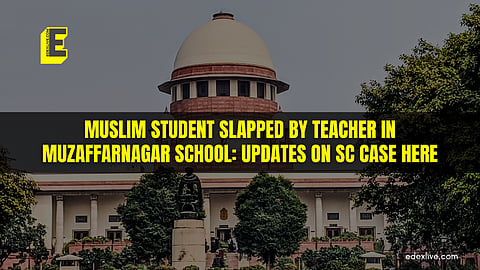

On November 28, the Supreme Court heard a PIL (Public Interest Litigation) filed by activist Tushar Gandhi regarding the case when a Muslim student was slapped by classmates after a teacher instructed them to in a Muzaffarnagar school and the implementation of the Right to Education Act, 2009.
Senior Advocate Shadan Farasat told the Supreme Court that while Rule 5 of the Uttar Pradesh RTE Rules, 2011 exists to protect children against religious discrimination in school, the authorities are not acknowledging the problem and addressing it, LiveLaw reported.
The case involves allegations of religious discrimination and physical punishment of a minor Muslim student by a teacher in Uttar Pradesh.
“The second is the issue of religious discrimination. There is a Rule – Rule 5, but they don’t seem to be actually acknowledging the problem. We have to first acknowledge the problem and then deal with it. So, they are not acknowledging it and then specifically dealing with it”, Farasat said, appearing for the petitioner, Tushar Gandhi.
Farasat highlighted three key issues in the case. There are:
1. The full implementation of Section 12(1)(c) of the Right to Education Act, which mandates that private unaided non-minority schools allocate at least 25 per cent of entry-level seats for children from disadvantaged sections
2. The issue is about religious discrimination
3. The chargesheet filed in the case, which Farasat claimed doesn’t seem to invoke the second proviso to Section 75 of the Juvenile Justice (Care and Protection of Children) Act (punishment for child cruelty) as previously directed by the court
Next date
A bench of Justice Abhay Oka and Justice Augustine George Masih directed Additional Advocate General Garima Prashad of Uttar Pradesh to appear on the next date, as stated by LiveLaw.
The PIL stems from a viral video showing a teacher, Tripta Tyagi, instructing students to slap a seven-year-old Muslim boy and make Islamophobic remarks. The incident, which occurred in August 2023, led to widespread outrage.
The apex court last year noted a “prima facie failure on the part of the State” to adhere to the Right to Education Act and rules, which prohibit the physical and mental harassment of students, and their discrimination based on religion and caste.
The court has been monitoring the issue, expressing dissatisfaction with the Uttar Pradesh police’s initial investigation and delays in registering an FIR.
